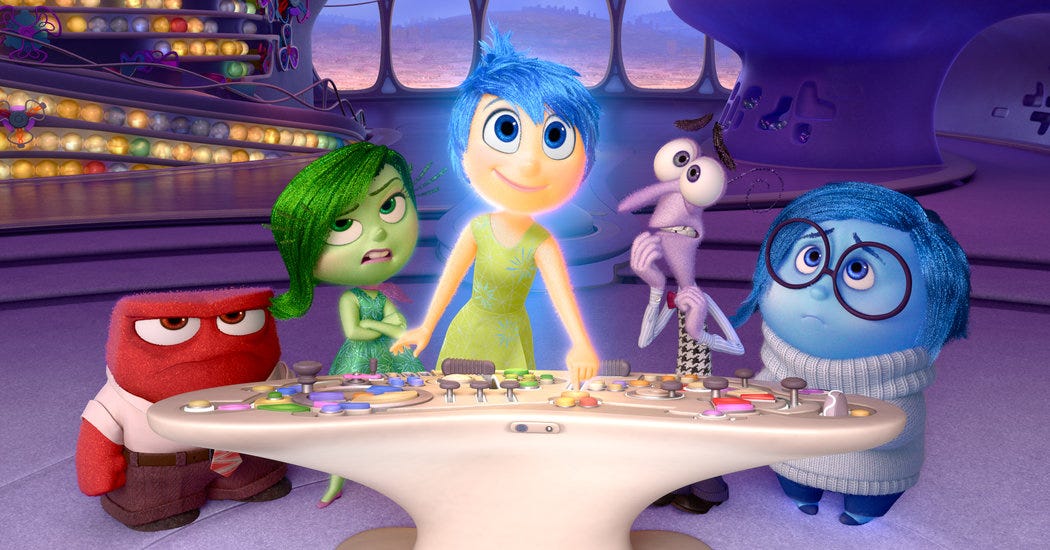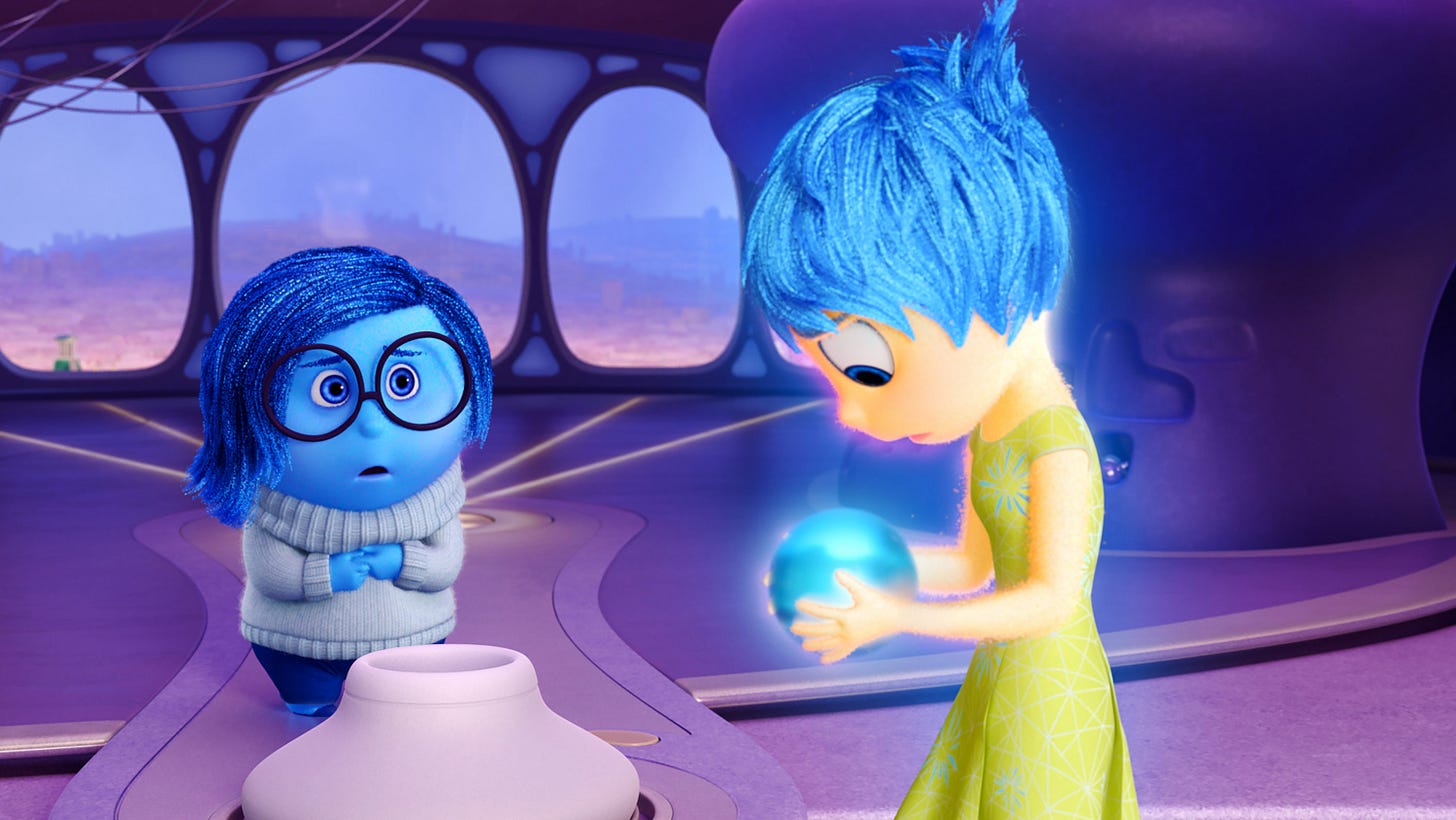Y'Know...For Kids

Last night, for the first time in five months, my wife and I took our kids to see a movie. At the drive-in, of course. The last time we saw a movie outside of our house — myself included — it was a Sunday night in early March at the same drive-in, where we saw Pixar’s Onward. The pandemic wasn’t officially a pandemic at that point, and I had one more week of in-person work ahead of me before my office allowed people to work from home (before closing altogether). Movies were still a thing, by which I mean new movies were still a thing.
Now, movies are still very much a thing. Old movies. Our local drive-in (located roughly 20 minutes from my house, quite conveniently) is in the middle of a Shark Week-style celebration, showing films like Deep Blue Sea and The Meg and so on. (Apparently, yes, the first two Jaws movies are playing there too at some point this week.) They were also playing Inside Out, and we decided to bring the kids to see the film, in part to just get out of the house for a few hours. (And stay in the car. Whatever.)
I don’t need to tell you that Inside Out is an excellent film, do I? Even as it bears the recognizable hallmarks of a Pixar film — a mismatched pair of characters become best friends during a fast-paced, manic adventure full of action and a heaping helping of emotion — Inside Out walks a careful fine line between sap and archness. I could go on at length, but what I was struck by again is the frustrating way that films such as Inside Out are treated by awards-giving bodies like the Academy of Motion Picture Arts and Sciences.

Inside Out, as you can imagine, won the Oscar for Best Animated Feature, because of course it did. (Frankly, its competition was pretty strong in 2015: Anomalisa and When Marnie Was There and Shaun the Sheep Movie were among its fellow nominees.) It received one other nomination, for Best Original Screenplay. Now, as then, I ask myself how it is that the Academy didn’t nominate the film for Best Picture — we’re well past the age when there were just five nominees in the category, and Pixar’s benefited from that expansion twice. It’s not so much that I wonder now if Toy Story 3 deserved its nomination more than Inside Out did. Deserve, as the fellow says, has nothing to do with it. But I don’t get how it missed. The same for Best Original Score — six years after Michael Giacchino correctly won for Up, he doesn’t even get a nod for this?
The loss in Screenplay is perhaps what rankles most of all, because if there’s any category where Pixar could ever break through the stigma of animation — as the line from The Hudsucker Proxy, too many people from the Academy perceive animation as being, y’know…for kids!, and thus not award-worthy — it’s this one. Seven Pixar films have been nominated in the category: Toy Story, Finding Nemo, The Incredibles, Ratatouille, WALL-E, Up, and Inside Out. Some of the films that won the category in those respective years, I get, largely because of at-the-time buzz and excitement. I get why The Usual Suspects or Eternal Sunshine of the Spotless Mind won (the latter arguably was a better screenplay than Brad Bird’s for The Incredibles).
Though time has been unkind, I get Juno winning over Ratatouille. Some of the winners are less distinctive, including the film that won over Inside Out, Spotlight. Aside from the weird coincidental irony that Tom McCarthy won an Oscar over a Pixar film six years after sharing a nomination with the same filmmaker (he’s one of the credited story writers for Up), I just ask myself, “Spotlight…the best original screenplay of the year? …..Really?” I’ve seen it, and it’s a very good film (and not remotely the best of 2015, not when Mad Max: Fury Road is staring you in the face). I just don’t buy its writing being that good.

Animation’s never going to shake the stigma of being for kids, of being juvenile. A film like Inside Out follows in the footsteps of many other Pixar films, in that it is clearly not just for kids. (Depending on how you look at it, you may even argue that it’s almost primarily for adults, even with — or especially with — its concept of letting memories die, of looking back on the past with wistful sadness, of leaving childhood and entering some form of maturity.) Is it possible that the Animated Feature Oscar perpetuates the stigma that Pixar cannot escape? Possibly, though it’s not as if Disney or Pixar was awash in Oscars outside of Best Song or Best Score before that. (Pixar only got nominations there.)
On one hand, the Oscars don’t matter, especially not to a person who’s never been nominated for one. But they lend an air of further, iron-clad legitimacy to a powerhouse studio, or an upstart. Some of the most original screenplays of any given year exist within animation, even as they wouldn’t be categorized as such. (You know what movie deserved an Adapted Screenplay nomination and didn’t get it? Spider-Man: Into the Spider-Verse.) Maybe one day, we’ll actually see a Screenplay Oscar go to an animated film from Pixar or Disney or the like. But only if the Academy grows up and moves beyond its dismissive treatment of animation.



